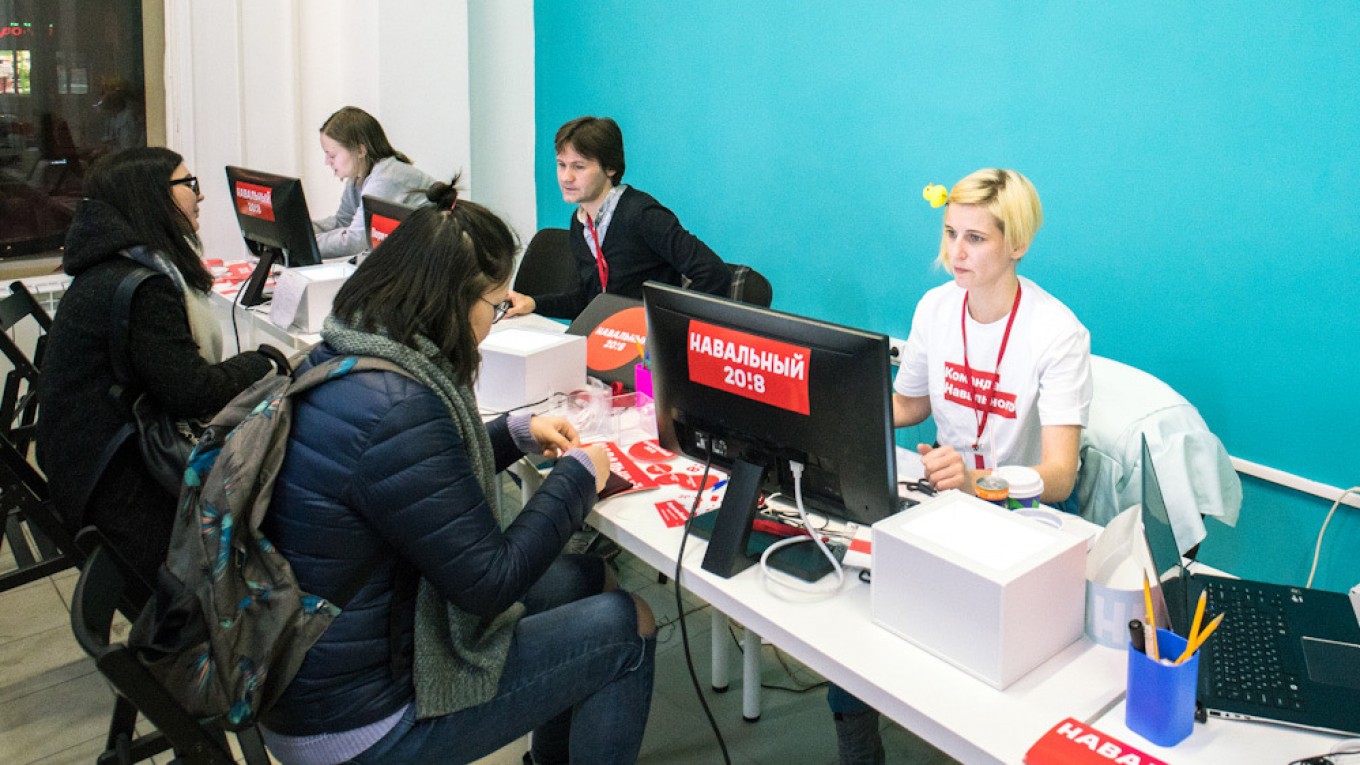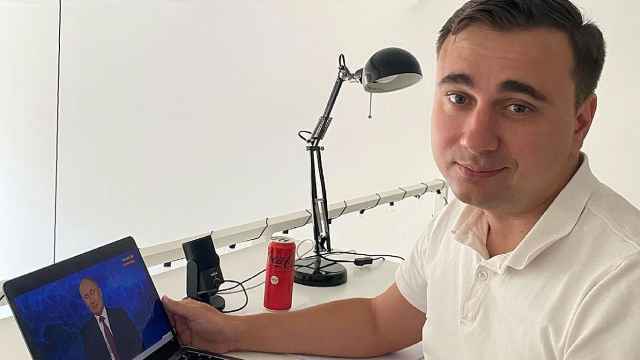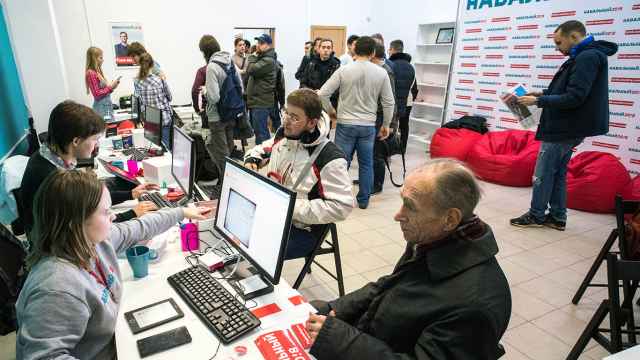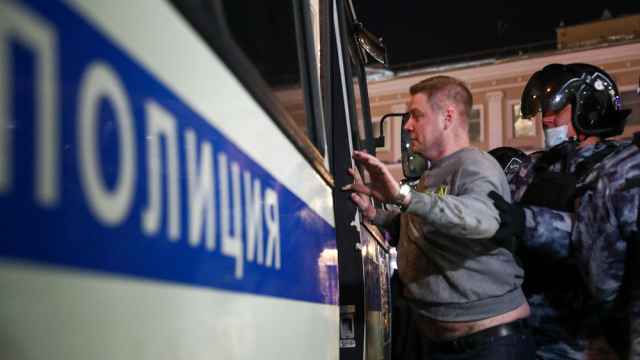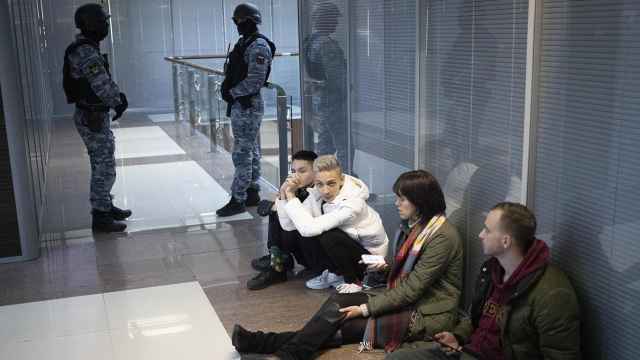Jailed Kremlin critic Alexei Navalny’s political network has been blacklisted as a “terrorist-linked” organization, Russia’s state financial watchdog Rosfinmonitoring said Friday.
“Navalny Networks” now appears on Rosfinmonitoring’s searchable database of groups and persons with links to terrorist activities, which includes al-Qaeda, the Taliban and the Islamic State. The designation means that authorities can block the organization’s bank accounts.
A Moscow court ruling banning the network’s crowdfunded work, as well as Navalny’s Anti-Corruption Foundation (FBK), as “extremist” organizations is expected next month. The ruling would ban the nationwide network of some 50 regional headquarters from operating and put members and supporters at risk of lengthy jail terms.
The network, which was founded in 2017 during Navalny’s quashed attempt to run for president and had since made its main work instigating protests and investigating corruption, formally disbanded Thursday in anticipation of the Moscow court ruling.
Navalny’s senior aide Leonid Volkov has said that the ruling will not affect the team’s “Smart Voting” strategy that seeks to unseat pro-Putin ruling party incumbents in this fall's key parliamentary elections.
However, he predicted that the movement would most likely transform into independent political entities.
Former Navalny staff across Russia told The Moscow Times that the ruling means the end of the organization’s current structure.
“Frankly, I have to be honest, we don’t have a plan for the future, but it's clear it's the end of an era,” said Diana Rudkova, the former head of Team Navalny in Tambov. Rudkova said she was currently “in survival mode,” scrambling to detach herself and other staff members from the organization, to prevent legal issues.
“Right now we are doing everything to guarantee the safety of our former staff. We are ending internet contracts, electricity bills, anything that could tie us to the Navalny movement.”
Rudkova’s sentiment was echoed by other staff across Russia who said their main priority was to guarantee the safety of former members and volunteers.
Navalny, 44, is serving two and a half years in a notoriously harsh prison outside Moscow after being found guilty in February of violating parole in an old fraud case while recovering from a near-fatal poisoning abroad.
He was detained immediately upon landing in Moscow in January and has since faced a slew of lawsuits and criminal cases, ranging from defaming a World War II veteran to creating an organization that “infringes on the liberties and rights of individuals.”
His and FBK's January exposé of President Vladimir Putin’s alleged $1.3 billion seaside palace has racked up more than 100 million views on YouTube and fueled massive nationwide protests against his rule.
Rosfinmonitoring’s designation comes amid what observers say is a widening crackdown on the Russian opposition in recent months.
On Thursday, a former Navalny coordinator was jailed for 2.5 years on pornography charges stemming from his social media repost of a music video by German metal band Rammstein. The next morning, the lawyer representing Navalny’s network was detained on criminal charges of sharing investigative details.
Meanwhile, Russian authorities have threatened to prosecute opposition activists under a rarely used article of criminal law against repeat protest violations. A number of Navalny staff have already fled the country under criminal charges and Rudkova and others told The Moscow Times they expected a new exodus of political activists.
Violetta Grudina, the former head of the Navalny movement in Russia’s far north Murmansk region, told The Moscow Times on Wednesday that the authorities' crackdown on the movement showed that the Kremlin fears “genuine, real civil society.”
“They are destroying any channel of dialogue with society.” Grudina said. “But we aren’t afraid. I am only more motivated and angry.”
On Thursday, Russian media reported that Grudina, who is also a vocal LGBT activist, was detained on undisclosed charges.
Lessons learned
Over the years, Navalny's movement had become Russia's most potent opposition force capable of organizing mass protests.
In January of this year, it organized protests in 198 towns and cities across the country in what were some of the largest anti-government demonstrations since 2011-2012.
The network had also seen genuine successes in local and regional electoral politics, particularly in the Siberian cities of Novosibirsk and Tomsk.
“We brought thousands on to the streets in towns and cities that haven’t seen protests since the end of the Soviet Union. No wonder the authorities wanted to close us,” said Semyon Kochkin, the former head of the Navalny movement in the city of Cheboksary on the Volga River.
Kochkin said that he “gained invaluable experience” from working for Navalny and his aides and vowed to use his skills in individual capacity in local politics.
“No one will stop me from making YouTube videos and writing about what is happening in the country. It is the start of something new.”
Samantha Berkhead and Nurbek Savitahunov contributed reporting.
A Message from The Moscow Times:
Dear readers,
We are facing unprecedented challenges. Russia's Prosecutor General's Office has designated The Moscow Times as an "undesirable" organization, criminalizing our work and putting our staff at risk of prosecution. This follows our earlier unjust labeling as a "foreign agent."
These actions are direct attempts to silence independent journalism in Russia. The authorities claim our work "discredits the decisions of the Russian leadership." We see things differently: we strive to provide accurate, unbiased reporting on Russia.
We, the journalists of The Moscow Times, refuse to be silenced. But to continue our work, we need your help.
Your support, no matter how small, makes a world of difference. If you can, please support us monthly starting from just $2. It's quick to set up, and every contribution makes a significant impact.
By supporting The Moscow Times, you're defending open, independent journalism in the face of repression. Thank you for standing with us.
Remind me later.



